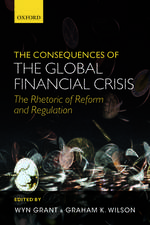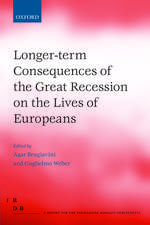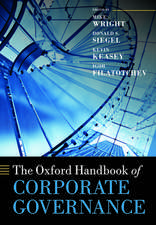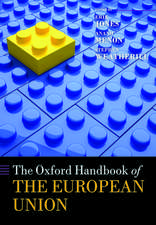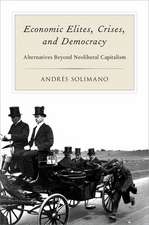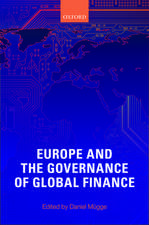European Social Models From Crisis to Crisis:: Employment and Inequality in the Era of Monetary Integration
Editat de Jon Erik Dølvik, Andrew Martinen Limba Engleză Paperback – 15 feb 2017
| Toate formatele și edițiile | Preț | Express |
|---|---|---|
| Paperback (1) | 228.54 lei 31-37 zile | |
| OUP OXFORD – 15 feb 2017 | 228.54 lei 31-37 zile | |
| Hardback (1) | 706.45 lei 31-37 zile | |
| Oxford University Press – 18 dec 2014 | 706.45 lei 31-37 zile |
Preț: 228.54 lei
Preț vechi: 274.29 lei
-17% Nou
Puncte Express: 343
Preț estimativ în valută:
43.74€ • 47.49$ • 36.74£
43.74€ • 47.49$ • 36.74£
Carte tipărită la comandă
Livrare economică 11-17 aprilie
Preluare comenzi: 021 569.72.76
Specificații
ISBN-13: 9780198798866
ISBN-10: 0198798865
Pagini: 464
Dimensiuni: 156 x 232 x 25 mm
Greutate: 0.69 kg
Editura: OUP OXFORD
Colecția OUP Oxford
Locul publicării:Oxford, United Kingdom
ISBN-10: 0198798865
Pagini: 464
Dimensiuni: 156 x 232 x 25 mm
Greutate: 0.69 kg
Editura: OUP OXFORD
Colecția OUP Oxford
Locul publicării:Oxford, United Kingdom
Recenzii
the editors and their team of experts have provided a detailed and critical compendium of European welfare state evolution over the last two decades. The reader can use it either to gain a comprehensive understanding of trends and issues, or as a point of reference for individual nations.
This book can be recommended to scholars and students of different disciplines, from political sciences and law to all strands of economic and social research. It is an indispensable and timely tool for all EU and domestic policy makers interested in shaping the future direction of the evolution of the European social models. The book could be also very useful for all those who are eager to understand the social dimension of the euro crisis.
`[T]his is an impressive volume that intelligently raises and answers a multitude of questions, and which has yet to find robust competition. The book is a must for the library of every political economist, comparative social policy scholar, and historically attuned economist.'Robert Hancke, Council for European Studies Reviews
`This is a fascinating book providing a wealth of information and incisive analysis on how monetary integration affects the evolution of social models in Europe. It is required reading for all those who are eager to understand the social dimension of the euro crisis.'Paul De Grauwe, John Paulson Professor in European Political Economy at the London School of Economics and Political Science
`European Social Models from Crisis to Crisis is an amazing volume with sobering conclusions for European welfare state and integration prospects. It is the first collection in welfare regime studies and comparative political economy to show how the European sovereign debt crisis, with its aftershocks of mass unemployment and rising inequality resulted from how monetary integration unfolded since the 1989 fall of the Berlin Wall. By doing so in a highly structured fashion, the volume rightly breaks with the convention of 'methodological nationalism.' It's a first rate, timely and utterly indispensable read for EU and domestic policy makers, welfare state students, political economists and EU integration pundits and academics.'Anton Hemerijck, Professor of Institutional Policy Analysis, VU University Amsterdam, and Centennial Professor of Social Policy, LSE
`This volume delivers a pioneering study of the connection between the development of Europe's monetary system and the evolution of European welfare and labour regimes. Analysing the causes and consequences of the recent crisis, Dølvik and Martin conclude that the divergence within the Eurozone is likely to deepen. Clearly, ignoring the crisis' severe social consequences implies risking disintegration of EMU and destabilisation of the EU. To better reconcile Europe's economic and social objectives, EMU needs further reform. Reading this book will help all who want to work on this in either theory or practice."'László Andor, Commissioner for Employment, Social Affairs and Inclusion, European Commission 2010-2014
impressive volume
This book can be recommended to scholars and students of different disciplines, from political sciences and law to all strands of economic and social research. It is an indispensable and timely tool for all EU and domestic policy makers interested in shaping the future direction of the evolution of the European social models. The book could be also very useful for all those who are eager to understand the social dimension of the euro crisis.
`[T]his is an impressive volume that intelligently raises and answers a multitude of questions, and which has yet to find robust competition. The book is a must for the library of every political economist, comparative social policy scholar, and historically attuned economist.'Robert Hancke, Council for European Studies Reviews
`This is a fascinating book providing a wealth of information and incisive analysis on how monetary integration affects the evolution of social models in Europe. It is required reading for all those who are eager to understand the social dimension of the euro crisis.'Paul De Grauwe, John Paulson Professor in European Political Economy at the London School of Economics and Political Science
`European Social Models from Crisis to Crisis is an amazing volume with sobering conclusions for European welfare state and integration prospects. It is the first collection in welfare regime studies and comparative political economy to show how the European sovereign debt crisis, with its aftershocks of mass unemployment and rising inequality resulted from how monetary integration unfolded since the 1989 fall of the Berlin Wall. By doing so in a highly structured fashion, the volume rightly breaks with the convention of 'methodological nationalism.' It's a first rate, timely and utterly indispensable read for EU and domestic policy makers, welfare state students, political economists and EU integration pundits and academics.'Anton Hemerijck, Professor of Institutional Policy Analysis, VU University Amsterdam, and Centennial Professor of Social Policy, LSE
`This volume delivers a pioneering study of the connection between the development of Europe's monetary system and the evolution of European welfare and labour regimes. Analysing the causes and consequences of the recent crisis, Dølvik and Martin conclude that the divergence within the Eurozone is likely to deepen. Clearly, ignoring the crisis' severe social consequences implies risking disintegration of EMU and destabilisation of the EU. To better reconcile Europe's economic and social objectives, EMU needs further reform. Reading this book will help all who want to work on this in either theory or practice."'László Andor, Commissioner for Employment, Social Affairs and Inclusion, European Commission 2010-2014
impressive volume
Notă biografică
Jon Erik Dølvik is Dr.philos, sociologist, and Head of Research at Fafo, Institute for Labour and Social Research in Oslo, where he has worked since the 1980s. Dølvik has published extensively in the field of comparative employment relations, social models, and labour migration in the Nordic and European context. His doctoral thesis was on Europeanization of trade unions and social dialogue in the 1990s. He is a longstanding member of the Editorial Panel of European Journal of Industrial Relations and Transfer -- European Review of Labour and Research. Besides stays as visiting scholar abroad, Dølvik has been member of several government appointed commissions regarding labour market issues and Norway's relationship to the EU, and is much used as expert commentator on such issues in the Norwegian public.Andrew Martin is a Research Associate, Center for European Studies, Harvard University. His publications include Euros and Europeans: Monetary Integration and the European Model of Society (2004), and The Brave New World of European Labor: Trade Union Responses to Economic Crisis in Western Europe (1999, both co-edited with G. Ross). Martin co-edits Open Forum, the interactive CES working papers series.


